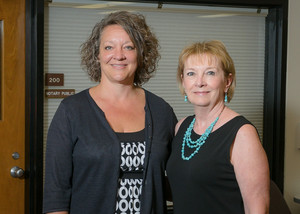CSC department helps students choose academic, career paths

CHADRON – An 18-year-old probably shouldn’t be expected to decide what job he or she wants to have for the rest of their life, but society seems to place that burden on high school graduates, according to Deena Kennell, director of the Internships and Career Services at Chadron State College.
And that expectation can create considerable anxiety for students as they enter college and choose a field of study to pursue, said Kennell, whose work includes advising incoming CSC students with undeclared majors on what courses they should take.
“We set them up in high school to feel like they have to know (what career to pursue),” said Kennell. “I don’t think that’s realistic, so the emphasis needs to be on ‘Here is this information to think about for these different careers. I’m not asking you to pick one right now.’”
Providing information and guidance to entering students, and to others who find problems with their original choice of majors, is just one facet of the services that Kennell’s department provides at Chadron State. From offices located in the Library Learning Commons, Kennell and office assistant Janet Hartman also facilitate and monitor internships for academic credit and help students create effective résumés, among other tasks.
Relatively few students enter college without any idea of what they want to study, according to Kennell, but some do and others are reluctant to choose a major because they think the decision can’t be changed. “They want to keep their options open, not realizing that their options are open regardless (of their initial choice of classes),” she said.
With students who are completely undecided, Kennell said she tries to find out what they are interested in, and then suggests that they take an introductory class in a related field, as well as an essential studies course. She tells students “You don’t have to pick your exact path in life right now and never change it.”
To help students understand what fields of study might be compatible with their own personality and interests Kennell can also provide and help interpret the Meyers Briggs Type Indicator and Strong Interest Inventory assessments
An online service called ‘What Can I Do With This Major,’ is a favored tool for new students and also those who are further along, said Kennell, because it gives them an idea of the many different jobs where a particular field of study can be applied. “Students don’t understand that there’s a really broad application for their degree,” she said. “I just try to get students to see that they are not in slots or pigeon holes anymore.”
That knowledge is particularly reassuring to students who enter college with a particular career in mind and then encounter difficulties in a class that is essential to the major, according to Kennell “I have students pretty rattled by that, but they are relieved when they realize there are other options,” she said.
Facilitating and monitoring internships is another part of the department’s role in helping students succeed and is the work that keeps Kennell and Hartman busiest throughout the year.
“We work with a student and faculty adviser to develop or seek an internship site…and monitor a student’s progress over the course of the term,” said Kennell. “Their final product is a compilation…that we forward to a retired faculty member who is contracted for grading.”
Internships are a form of the experiential learning that has become increasingly important in education, Kennell said.
“It’s a high impact learning opportunity where students are really able to see how to apply what they have studied, in addition to the fringe benefits…like career exploration,” she said. “We have lots of students go through that program.”
Students typically take most of the responsibility for arranging their internships, which allows them to select the type of job that fits their own interest. Kennell has monitored reports from a variety of jobs and locations, including an oilfield in Texas, a human fertility clinic, a veterinarian office, a business that arranges competitive youth sports events, and an artificial insemination center.
Although internships used to be more common during summer break, “as the nature of our workforce is becoming more flexible, we don’t see any difference in enrollment between terms,” said Kennell. This summer the office is tracking 61 internships, with a total of 251 credit hours. In the spring, 2016 semester the office handled approximately 85 interns, she said.
Assistance with creating résumés, another service the department offers CSC students, has long been a standard feature of career services. In addition, Kennell said she now also encourages students to create a page on Linkedin, a popular online site for listing educational qualifications and skills and for making connections with employers. She has also begun encouraging students to build online portfolios to showcase their accomplishments.
While online and social media services can be valuable for graduates seeking employment, Kennell said she gives students a bit of advice that can be very important as they enter the job market. “I advise them to turn their Facebook page into something more professional,” she said. “I tell students, ‘If you think we’re not going to look up your Facebook page when we hire you, you are wrong,’ Our decisions could be influenced by that.”
Other services offered through the Internship and Career Services department include helping students practice job interview skills, organizing two career fairs and a teacher interview day each year and conducting a graduate placement survey.
Category: Campus News, Employee Awards & Achievements, Student Services
